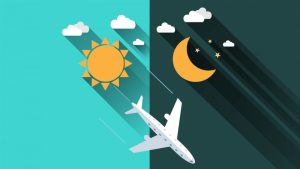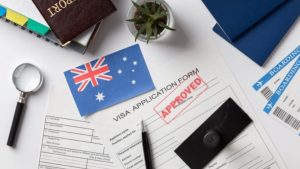Studying abroad combines the thrill of new experiences with the complexities of adapting to unfamiliar environments. Facing cultural differences, language nuances, and managing finances can be challenging. Thorough preparation, including understanding local customs, organizing essential documents, and securing resources, helps create a smoother transition, enhancing both personal growth and academic success.
I. Challenges of Studying Abroad
1. Time Zone and Weather Adjustment
Time zone and weather differences will be the first challenge when you step off the plane in a foreign country. Many may take quite some time to adjust their biological clocks or get used to the weather to suit their new place of residence.
Therefore, it’s important to start adapting and researching the weather and time zone before studying abroad. This way, you can prepare appropriate clothing and have a steady mindset before your journey.
 2. Cultural and Communication Differences
2. Cultural and Communication Differences
Every country has its own unique culture and language. At home, you might have high English scores and outstanding achievements. However, when studying abroad, language often becomes a significant obstacle for many students.

The greatest challenge in integration is language. Being able to speak English and conversing fluently with locals, or mastering the local language, are two very different things. Many international students feel shy or hesitant to ask for clarification when they don’t understand, which leads to awkward situations. Some may write well but are reluctant to speak, making it difficult to expand their social circle.
In addition, cultural differences can lead to some awkward or challenging situations. For example, countries like Australia and the U.S. are multicultural societies, where avoiding topics like religion and politics is considered polite and respectful. Besides researching the local culture beforehand, it’s essential to learn to listen and observe, adjusting your language accordingly to communicate more effectively.
3. Homesickness and Loneliness
Studying abroad offers a period of independence, where you learn to live without relying on family. However, many students struggle with homesickness and loneliness, especially in the initial stages of their journey.
Don’t let this turn you away from new experiences. In a new country, there is much to explore and learn. Once you’ve decided where to study, it’s essential to plan thoroughly and maintain a resilient mindset for the journey ahead.
4. Making Friends: Local or International?
One common challenge for new international students is making friends. Some tend to stick with Local groups for comfort and ease of communication. It’s worth considering “opening up” to different groups while finding a balance.
Building friendships with international students can broaden your social network and cultural knowledge. At the same time, staying connected with Vietnamese friends provides mutual support for overcoming student life challenges, as only fellow compatriots may fully understand and offer the right support.
 II. Important Preparations for Studying Abroad
II. Important Preparations for Studying Abroad
To have a smooth study abroad experience, students need to prepare essential documents, improve their English proficiency, and secure personal finances.
1. Complete Study Abroad Application
Once you have decided on the country and school, you can start preparing your study abroad application.
Each country has different requirements for documentation and proof of eligibility, which are updated on each government’s official website. Key documents to include in your application are:
- Student visa application
- Valid passport
- ID photos as per required size
- Resume and personal documents such as household registration and birth certificate
- Admission letter from the chosen school
- Financial proof, such as bank statements and savings accounts
- High school diploma and transcripts
Contact us for application submission assistance
![]() Visa FOPA Company
Visa FOPA Company
📞+84 906 044 975 (Mr. Do)

2. English Proficiency
To make your study abroad experience smoother, it’s important to improve your English skills. Generally, you should aim for an IELTS Academic score of at least 6.0 to make studying abroad easier. For certain fields like English, literature, or education, a higher score, such as 7.0 overall in IELTS Academic, may be required.
3. Adequate Finances
Studying abroad can be quite expensive, with costs for tuition, accommodation, living expenses, travel, and food. Therefore, it’s crucial to ensure you have sufficient financial resources to make your study abroad experience more manageable.

In addition to saving up for your studies, you can apply for scholarships from the government or universities. Scholarships usually range from 10% to 100%, depending on your achievements and eligibility. Additionally, choosing a suitable study abroad program or opting for installment payments can help optimize your finances.
4. Researching the destination’s culture
Researching the destination’s culture is an essential preparation for studying abroad. Understanding local customs, traditions, and social norms will help you adapt more easily and avoid cultural misunderstandings. This includes learning about communication styles, food, dress codes, and local etiquette. Familiarizing yourself with these cultural aspects not only enhances your experience but also helps you build positive relationships with locals and fellow students.

>>>Hanoi’s culture: The TOP 3 unique features of Hanoi’s culture
Overall, answering the question of what studying abroad is isn’t too difficult. Beyond simply understanding what studying abroad means, each individual needs to have a clear plan and career direction after graduation to make their study abroad experience meaningful and enjoyable.
![]() Visa FOPA Company
Visa FOPA Company
📞+84 906 044 975 (Mr. Do)


